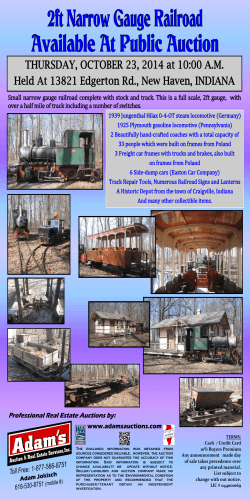
Ozark Fisherman Photo Essay: How to Build an Ultralight Drift Boat
Photo Essay: How to Build an Ozark Fisherman Ultralight Drift Boat Plans for this boat may be found at: http://www.spirainternational.com/ Building the Ozark Fishermen Ultralight Drift Boat The Ozark Fisherman, like all Spira International framed boats, is built on a simple strongback jig. This is simply a sturdy beam on which the frames and other elements of the hull’s framing are set up and temporarily attached to hold them in position until the adhesive holding the frame together is cured. This builder elected to make his strongback in two pieces so that it ccould be taken apart and stored easily. They are made from any convenient scrap lumber. The frames are made by drawing out the frame sizes on a piece of plywood, then cuttion out the standard milled lumber to the sizes drawn. The simple lap joints are epoxied, or glued using polyurethane or other construction grade, waterproof adhesive. Screws are run in to hold th ejoints together while the glue dries. The adhesive makes the joint, not the fastener, so the screws can actually be removed after the joint is complete. Most builders elect to leave the screws in, but this means lower cost fasteners may be used, like stainless and brass, than are used for traditional wooden boats. The frames are set up on the strongback, and then it looks something like this. Here, the stem is being fitted. It is temporarily fastened to the angled end of the strongback jig and then the keelson, running right down the centerline, is attached to it and to the frames. The frames are notched and long stringers called the sheer clamp (shown) and the chine log which will go in the corner where the side and bottom frame elements meet, are bent around the frames These longitudinal elements may be scarfed together from shorter pieces of lumber if needed. Where the sheer clamp and chine log meet the stem and transom, notches are cut to ensure the member remains flat to later accept the plywood covering. Like the frames these are bonded using epoxy or other adhesive and fastened in-place to complete the framing. The completed framing ready to be prepared for the plywood covering. Before the ply is attached, though the frame elements must be “faired” This means angling the surfaces that come in contact with the plywood so that there is a nice flat bonding surface so that the ply can be bonded without any major gaps. This is easily accomplished using a plane drawknife, angle grinder, belt sander, or other similar device that will remove small amounts of wood at at a time: The plywood is cut out by using the framing as a pattern. It is them bonded and fastened inplace to the framing. Most builders elect to add a layer of fiberglass to the outside of the hull. This toughens up the hull and helps seal it. It is not mandatory though, the plywood can be simply saturated with epoxy to strengthen and seal it, if the builder is trying to keep costs down. Seats, rub rails oar locks, cleats and other accessories complete the construction. and make your new boat ready for use. All Done! This could be you in a couple of weeks for around $100 in materials.
© Copyright 2026











